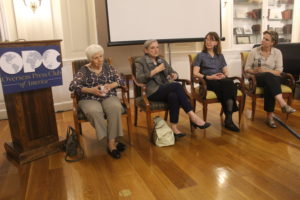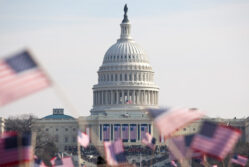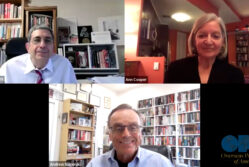Event Coverage Highlight

Filmmakers Discuss Iraq’s ‘Queen of the Desert’
 By Chad Bouchard
By Chad Bouchard
War, sectarian conflict and the rise of terrorist groups like ISIS have dominated headlines about Iraq for more than a decade. Some observers point to roots of conflict that reach back to the drawing of artificial boundaries by Western powers following the fall of the Ottoman Empire in 1920. Gertrude Bell, a British spy and explorer who is sometimes called the “female Lawrence of Arabia,” was a central figure in the early forging of this amalgamized nation and the shaping of the Middle East.
On May 17, the OPC hosted a special sneak preview at International House of a new documentary about Bell’s life, Letters from Baghdad.
Bell traveled widely in Arabia before being recruited by British military intelligence during WWI to help draw the borders of Iraq and as a result helped shape the modern Middle East.
Following the screening, a panel including filmmakers Sabine Krayenbuhl and Zeva Oelbaum discussed the project and the Bell’s legacy.
Krayenbuhl said they chose Bell as a subject for a documentary in part because of its relevance and parallels to more recent turmoil.
“From the beginning, we thought this film would make a great springboard for discussion,” she said. “When we started the film five years ago, it was at the moment the U.S. had pulled out of Iraq, so the political context had shifted to the background and sadly by the time we finished the film, the Middle East is once again in the headlines”
Research took the filmmakers to more than 25 different archives around the world, including some based in Russia, the Netherlands, France, U.K., Germany and the U.S. A Gertrude bell archive at Newcastle University held photographs and 1600 letters that she wrote to her family.
Oelbaum said they were surprised to discover how much “Miss Bell’s” legacy remains present in Iraq, even as knowledge of her story has faded in her home country of the U.K. Bell was addressed with the title “al Khatun,” an honorific usually reserved for queens.
Oelbaum said when the Iraqi Ambassador to the United States recently saw the film at a screening in Washington D.C., he remarked that “you really need to understand this is a real term of respect and it’s not a term that’s thrown lightly around,” she recalls him as saying. “So there seems to be enormous recognition still in Iraq about her.”
Also speaking on the panel was Lisa Anderson, a specialist on politics in the Middle East and North Africa who was president of The American University of Cairo from 2011 to 2016.
Anderson said that often portrayals of Bell default to her unusual role as a woman in a world of men.
“But she’s also a representative of a very interesting complicated role in the 20th century which is the liberal imperialist,” she said. Who many see as “real creeps.”
“That’s how we think of them perhaps, but that era had lots and lots of people who thought they were doing good things for the natives. Really genuinely believed that. Knew the language, cared deeply, thought that British influence was the best thing that could happen but thought that this should be on the way to empowerment – the kinds of things that [Bell] said.”
One of Bell’s biggest legacies is her dedication to the creation of the Iraqi National Museum. Lamia Al Gailani Werr, a British-Iraqi archaeologist and expert in the establishment of the museum, also spoke on the panel. She provided an update on efforts to recover some of the 15,000 objects that were looted from the museum during the U.S. invasion in 2003.
“About 4000 have come back and the rest haven’t,” she said. “Very few have come out in the [black] market, so where have they gone? Of about 5000 of the [inscribed cylinder seals], which are small objects, only 600 have come back.”


